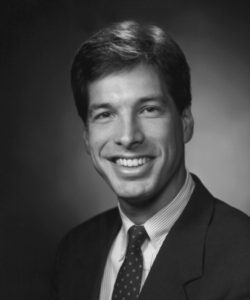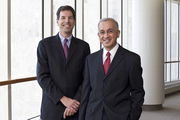John Poterucha, M.D. — Q&A with a Teacher of the Year Hall of Famer
John Poterucha, M.D. (I ’89, GI ’92), has received nine Teacher of the Year awards from Mayo Clinic School of Graduate Medical Education, one from Mayo Clinic School of Medicine and three from the Gastroenterology and Hepatology Fellowship Program. He’s in the Mayo Clinic School of Graduate Medical Education Teacher of the Year Hall of Fame, and a recipient of the Mayo Clinic Department of Medicine Laureate Award, Outstanding Faculty for the Mayo Clinic School of Continuous Professional Development award, Mayo Clinic College of Medicine Outstanding Course Director award, Mayo Clinic School of Medicine Teaching Excellence Award and Distinguished Mayo Educator award. His teaching awards span almost three decades.

John Poterucha, M.D., in 1992, the year he joined the Mayo Clinic staff.
Dr. Poterucha is a consultant in the Division of Gastroenterology and Hepatology, Department of Medicine at Mayo Clinic in Rochester, and a professor of medicine in the Mayo Clinic College of Medicine and Science. He came to Mayo Clinic in 1989 as a fellow and joined the staff in 1992. He has served as chair of Education for the Division of Gastroenterology and Hepatology, director of the Fellowship Training Program and director of the Transplant Hepatology Fellowship. Today he teaches GI to second-year medical students, provides one-on-one training to fellows, and conducts CME training. He says if he retired tomorrow, among the things he’d miss the most is working with and educating fellows.
How do you know when you’ve done a good job teaching?

During lectures, you can pick up on nonverbal cues to see if learners are engaged — Have they remained awake? Are they asking questions? Engagement equals success with larger and smaller audiences. One-on-one with fellows, I ask a lot of questions to engage them. Additionally, our division provides feedback from evaluations the fellows provide.
Sometimes I get feedback years later. In the late 1990s and early 2000s, I was program director of the fellowship program. I had to give feedback from faculty members to a fellow about a relatively minor professionalism issue. It was clear that he was devastated by the news. Years later when he was at another institution and training his own fellows, he contacted me to ask if I remembered that incident. He said he thought it was one of the worst days of his life at the time but, in retrospect, one of the best things that had happened to him. He wanted to thank me for how I handled it and how it helped him change. As an educator, you have to do unpopular, hard things. The worst thing you can do is to allow trainees to continue less-than-ideal behaviors. It’s like being a parent — you don’t appreciate how important parenting is until you have your own kids.
What’s rewarding about teaching?
In your own small way, you’re helping to make physicians a little better by expanding their knowledge base, helping them deal with patients and helping them get jobs.
It’s gratifying to see former fellows come back to Mayo Clinic for CME courses and call when they have tough cases.
What’s your teaching style?
I’m open. I think I’m good at putting myself in my learners’ position. I try to make their day easier when I can. For example, on the consult service with fellows, we cover both Mayo Clinic hospitals in Rochester. If we have four consults at one hospital and one at the other on a weekend, I suggest the fellow do the four and I’ll take the other one. It shows them I know where they’re coming from and remember what it’s like to be a fellow.
I enjoy using Q&A to engage learners.
Has your teaching style changed through the years?
I am better now at knowing what learners need to know. And I’m not afraid to say what I don’t know. That comes with confidence.
Have students changed through the years?
Yes. They have so much more information available to them now than when I started. I remember when it was an innovation that we had our slides available to medical students on the intranet. Before that, we had to print copies for them.
Who are your teaching role models?
First and foremost is my wife, Bonnie, a high school band director. I’ve learned by watching her deal with kids. Her attitude is always upbeat.
I have learned from watching my colleague Patrick Kamath, M.D. (GI ’88, GI ’92). His demeanor is always calm, caring and nurturing.

John Poterucha, M.D., and Patrick Kamath, M.D., both Teacher of the Year Hall of Fame members
I also learned from a mentor during residency. Jonathan Clain, M.D. (GI ’76, GI ’89), was my staff person during my GI rotation. I didn’t know yet that I wanted to go into GI. Dr. Clain used the Socratic method and asked questions. It was a great experience, especially when I knew the answers. I saw how he assessed residents’ knowledge base in doing that.
What do Teacher of the Year awards mean to you?
I feel incredibly lucky and blessed. Mayo is a big place and has many good educators who don’t receive awards. When you receive an award, you feel like you’re doing something right.
Student comments
“Dr. Poterucha is an exemplary teacher, known for giving trainees his undivided attention, listening to case presentations in a thoughtful, supportive fashion, and always making himself available to answer questions and help with patient care.”
“When discussing cases with Dr. Poterucha, he listens to your entire presentation as if he doesn’t have another worry in the world, whether you run into him in the hallway, his office or you page or email him. In reality, he probably has several patients scheduled, but he teaches effortlessly and does a wonderful job.”
“His teaching style is effective because he’s enthusiastic and encouraging, and he allows trainees sufficient autonomy with adequate supervision.”
“Watching his interaction with patients is a true display of the art of medicine. I cannot think of a kinder, more supportive consultant throughout the Mayo enterprise. Whenever any of us have the opportunity to work with Dr. Poterucha, it is a genuine pleasure.”